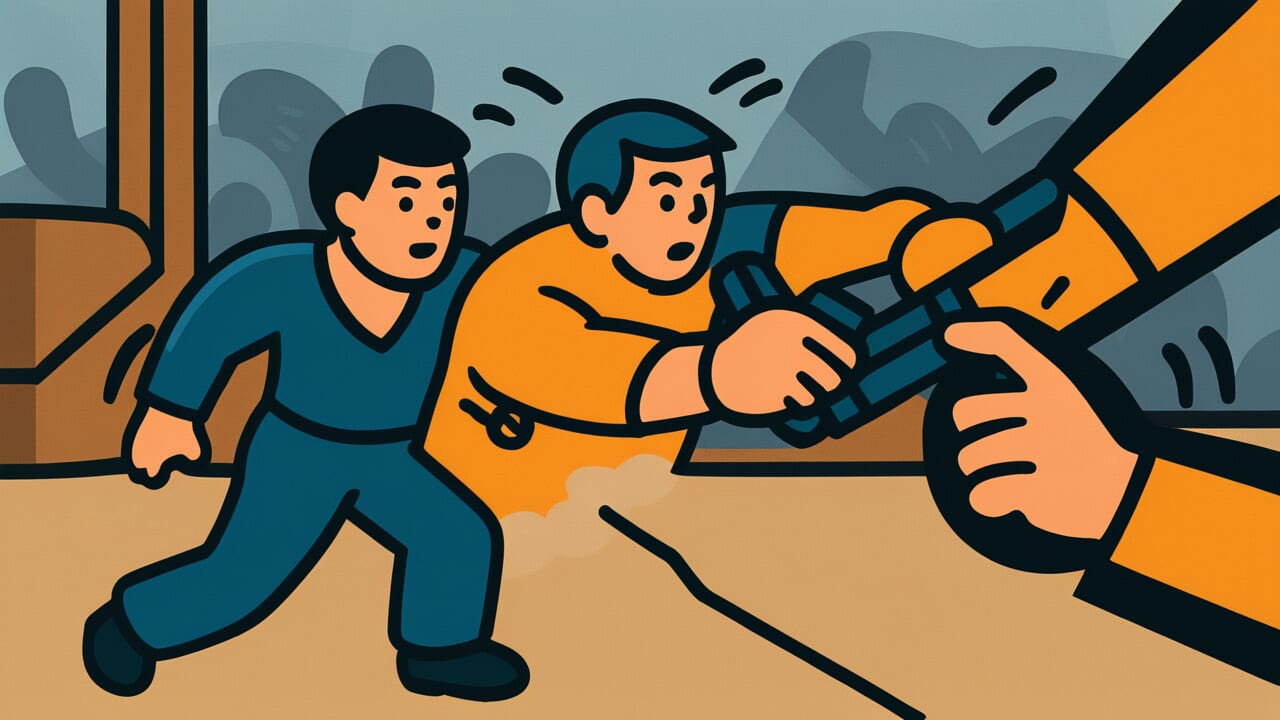How to Read “If you defend the front attack, the rear attack will come around”
おうてをふせげばからめてがまわる
Meaning of “If you defend the front attack, the rear attack will come around”
This proverb describes a situation where solving one problem creates another from a different direction.
When you focus all your energy on defending against a threat from the front, an attack comes from behind.
In other words, complete defense is nearly impossible. Taking measures against one weakness often creates another.
People use this expression when dealing with work troubles or managing relationships where multiple problems arise at once.
If you prioritize one issue, another gets neglected. You end up unable to solve everything satisfactorily.
Even today, we often feel the weight of this proverb’s meaning. This happens when we must handle multiple challenges with limited time and resources.
Origin and Etymology
This proverb likely originated from military terminology used in Japanese castle siege warfare.
“Ōte” refers to the main force attacking from the front. “Karamete” refers to a separate unit that circles around to attack from the rear or sides.
Castles had a main gate called “ōtemon” and a rear gate called “karametemon.” During sieges, attackers would assault the front while simultaneously attempting to infiltrate from the back.
From the Warring States period through the Edo period, military commanders knew this well. If they strengthened the front defense, enemies would surely strike from behind.
With limited troops, perfectly defending all directions was impossible. Reinforcing one side always created vulnerabilities elsewhere.
This battlefield reality eventually became a common saying. It came to express the difficulty of handling problems in everyday life.
The exact first written appearance is unclear. However, practical wisdom from warrior society spread to common people.
The expression took root as a way to describe a universal truth. Solving one problem often leads to another emerging.
Interesting Facts
In castle architecture, defenders sometimes intentionally weakened the rear gate’s defenses.
Why? Because luring enemies to the rear gate allowed defenders to ambush them in narrow passages. This was actually more advantageous.
In other words, some defensive strategies assumed “the rear attack will come around” and planned accordingly.
As a military term, “karamete” meant more than just a back entrance. It also carried the active meaning of “entangling” or “ensnaring.”
It described a sophisticated tactic. The front attack would distract the enemy while a separate force circled around to surround them.
Usage Examples
- We strengthened security, but now customers complain it’s too hard to use. It’s truly “if you defend the front attack, the rear attack will come around.”
- I increased my child’s study time, but now they’re sleep-deprived and getting sick. This is exactly “if you defend the front attack, the rear attack will come around.”
Universal Wisdom
This proverb has been passed down because it brilliantly captures a fundamental human dilemma.
We constantly seek perfection. We want to solve all problems simultaneously. But in reality, our time, resources, and abilities are limited.
If we concentrate on one thing, something else inevitably gets neglected. This is an essential constraint of human existence.
What’s interesting is that this proverb doesn’t preach resignation. Rather, it faces the reality that perfect defense doesn’t exist.
It then suggests wisdom about how to navigate that reality.
Warring States commanders knew defending everything was impossible. Yet they developed strategies by setting priorities and sometimes deliberately creating openings to lure enemies.
The same applies to life. Perfectionism that tries to do everything flawlessly only traps you.
What should you protect? What should you let go? That choice is the wisdom of living.
This proverb teaches us the importance of having “the courage to choose.” Acknowledging limits isn’t weakness.
Rather, it’s the strength that comes from facing reality squarely.
When AI Hears This
The fundamental problem defenders face is being forced to disperse their resources.
For example, if castle defenders place 100 soldiers at the front gate, fewer soldiers remain for the rear gate.
Suppose they split forces evenly: 50 at the front, 50 at the rear. Meanwhile, attackers can concentrate all 100 soldiers at the rear gate.
At that moment, an overwhelming force imbalance of 100 versus 50 emerges at the rear.
This asymmetry can be expressed mathematically. Defender force density equals “total resources ÷ number of points to defend.”
With two locations, forces are halved. With ten locations, they’re reduced to one-tenth. But attackers can apply “total resources × 1” to any single point.
As defendable points increase, defenders become exponentially disadvantaged.
Modern cybersecurity shows the same structure. Companies must address vulnerabilities in thousands of systems.
But attackers only need to find one hole to break in. This is called the “attacker’s advantage principle,” and it troubles security experts.
Even more interesting is the paradox: the more defenders aim for perfection, the more vulnerable they become.
Trying to defend all points equally means every point ends up half-defended.
Lessons for Today
This proverb teaches modern people the courage to let go of perfection.
At work and at home, we try too hard to do everything perfectly. But if we pour all our energy into one problem, distortion inevitably appears elsewhere.
That’s an unavoidable reality.
What matters is developing an eye for what’s truly important. Don’t try to defend everything. Set priorities.
Sometimes have the courage to deliberately do less. That’s not laziness. It’s strategy for using limited resources most effectively.
We also need flexibility to respond when problems keep appearing. Solve one, then move to the next. That’s perfectly fine.
Once you know a perfect state will never arrive, you actually feel relieved. Life is a continuous series of problem-solving.
That itself is the essence of living. You too can relax your shoulders and do your best within your capacity.
That’s enough.



Comments